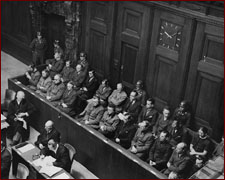
|

|
|
 The 23 defendant doctors in the dock at the Nuremberg
"Doctors Trial," 1946-47.
The 23 defendant doctors in the dock at the Nuremberg
"Doctors Trial," 1946-47.
|
What if you knew that the medical competence of the Nazi
doctors has been questioned?
The Hippocratic Oath, penned by the father of medicine and
held by medical professionals as a sacred tenet to this day,
states in part: "I will use treatment to help the sick
according to my ability and judgment, but never with a view to
injury and wrongdoing...." The Nazi experimenters not only
violated the oath in the foulest way, causing them to
relinquish forever all rights to be considered doctors, but
their expertise has been called into question, even by their
own countrymen in their own day.
"Of course I am a doctor and I want to preserve life. And
out of respect for human life, I would remove a gangrenous
appendix from a diseased body. The Jew is the gangrenous
appendix in the body of mankind."
—Dr. Fritz Klein, Nazi physician, responding to a
concentration-camp inmate who asked, while pointing to
smoking chimneys in the distance, "How can you reconcile
that with your [Hippocratic] oath as a doctor?"
[1]
"I wouldn't trust the man who produced the data [from the
Nazi experiments]; how can you trust a man who would do
that?"
—Seymour Siegel, Executive Director of the U.S.
Holocaust Memorial Council [2]
"Their actions were clear, direct violations of both the
Hippocratic Oath as well as the public's belief that doctors
always look after their patients' well-being."
—Lauren Howell, in "Nazi Medical Experiments:
Murder or Research?" [3]
"One characteristic feature of Heissmeyer's experiment is
his extraordinary lack of concern, add this to his gross and
total ignorance in the field of immunology, in particular
bacteriology. He did not then, nor does he now, possess the
necessary expertise demanded in a specialist [on] TB
diseases ... He does not own any modern bacteriology
textbook. He is also not familiar with the various work
methods of bacteriology ... According to his own admission,
Heissmeyer was not concerned about curing the prisoners who
were put at his disposal. Nor did he believe that his
experiments would produce therapeutic results, and he
actually counted on there being detrimental, indeed fatal,
outcomes to the prisoners."
—Dr. Otto Prokop, Germany's forensic authority,
on the competence of Dr. Kurt Heissmeyer. Heissmeyer
conducted
tuberculosis experiments
on 20 Jewish children from Auschwitz whom he later had
hung so they could not bear witness. [4]

Yes
|
No
References
1.
Lifton, p. 16.
2.
Moe,
p. 6.
3. See
www.hklaw.com/holocaust/essays/1999/993.htm.
4.
Lifton, p. 457n.
Photo: Hedy Epstein, courtesy of USHMM Photo Archives
The Director's Story
|
Timeline of Nazi Abuses
Results of Death-Camp Experiments: Should They Be Used?
Exposing Flawed Science
|
Resources
Transcript
|
Site Map
|
Holocaust on Trial Home
Editor's Picks
|
Previous Sites
|
Join Us/E-mail
|
TV/Web Schedule
About NOVA |
Teachers |
Site Map |
Shop |
Jobs |
Search |
To print
PBS Online |
NOVA Online |
WGBH
©
| Updated October 2000
|
|
|



